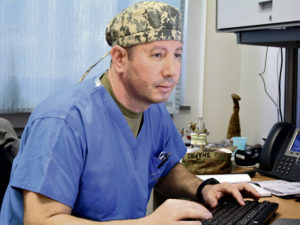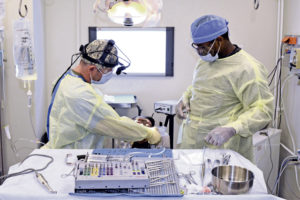
The Army continues to ensure diversity, equity and inclusion across the force and highlight the diverse talents of its people. Army Maj. (Dr.) Slava Shapiro is proud to be a part of the Army family and that diversity.
Born in Kiev, Ukraine, Shapiro’s family moved to the United States when he was 17 years old.
“At that time, a lot of families were moving from the former Soviet Union, and my family also moved as refugees,” said Maj. (Dr.) Slava Shapiro, an oral surgeon assigned to Landstuhl Regional Medical Center.
Shapiro grew up in New York City, and following high school, attended New York University, where he graduated with a Bachelor of Science degree in 1996. After that, he attended dental and medical school, graduating in 2005.
After working in private practice for 11 years on Long Island, N.Y., Shapiro decided to join the Army.
“One of the main reasons I joined the Army was for the opportunities it offers me to work in a variety of different environments and to serve in various assignments around the world,” said Shapiro. “From a professional development perspective, the Army also offers me the opportunity to exchange experiences and ideas with other dental professionals.”

During a 2001 internship at a hospital in Brooklyn, Shapiro frequently encountered patients with facial trauma. During his internship, attending oral surgeons at the hospital suggested that Shapiro apply for an oral maxillofacial surgery residency, which he did.
“While taking continuing education courses in my specialty, I became friends with some military oral surgeons,” said Shapiro. “I was really fascinated by their stories and enthusiasm about the military. It was at this point that I decided to join the Army and become an Army dentist and subsequently, an oral surgeon.”
Oral maxillofacial surgeons examine, diagnose, and treat or prescribe treatment for conditions involving disease, defect, or injury to the oral and maxillofacial region including oral and maxillofacial surgical procedures and adjunctive care.
“I applied for, and received, a direct commission into the Army in February 2020,” Shapiro added. “After having been in the Army for more than a year now, I highly encourage dental students or practicing dentists to stop thinking about it and join the Army. The Army offers so many opportunities to advance yourself both academically and professionally. It is a win-win situation all around.”
Shapiro said there is a big difference between being a dentist, or oral surgeon, in the Army and being a civilian dentist, or oral surgeon.
“In the Army, not only are we dental providers, providing dental care to our Soldiers, but we are also commissioned officers supporting the Army’s readiness priority,” said Shapiro.
The Army Dental Corps consists of nine specialties including; comprehensive dentistry, oral and maxillofacial surgery, orthodontistry, prosthodontistry, oral pathology, endodontistry and more.
“My wife and kids are very proud of my choice,” said Shapiro. “I look forward to a long and exciting career in the Army.”
To learn more about the Army Dental Corps, visit https://armydentalcorps.amedd.army.mil/.


